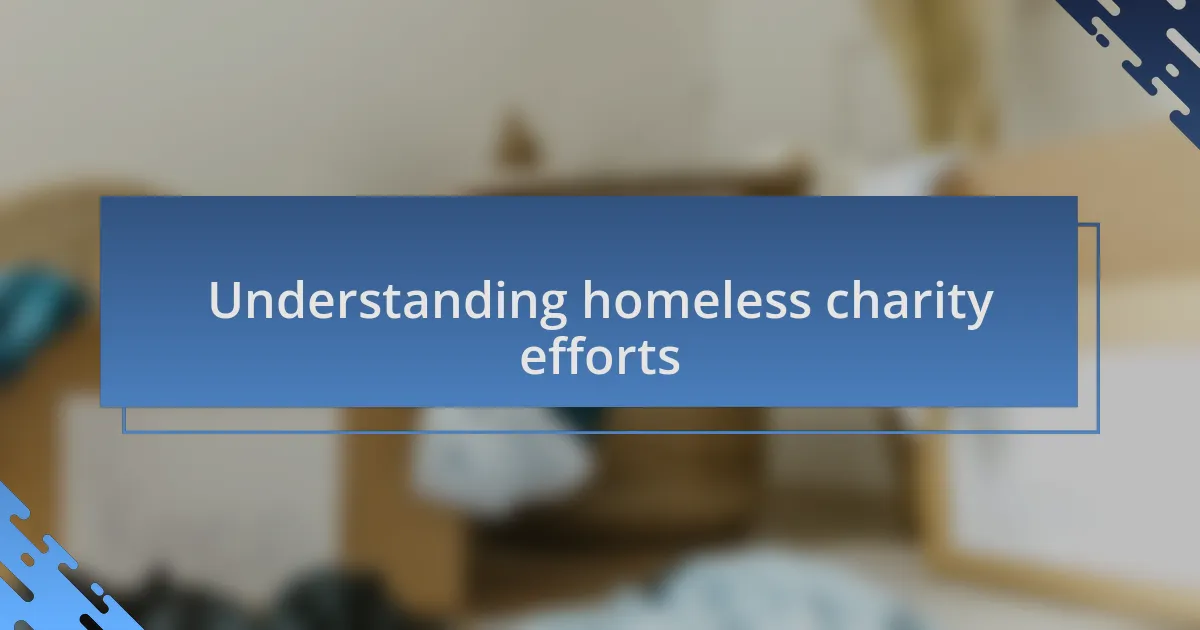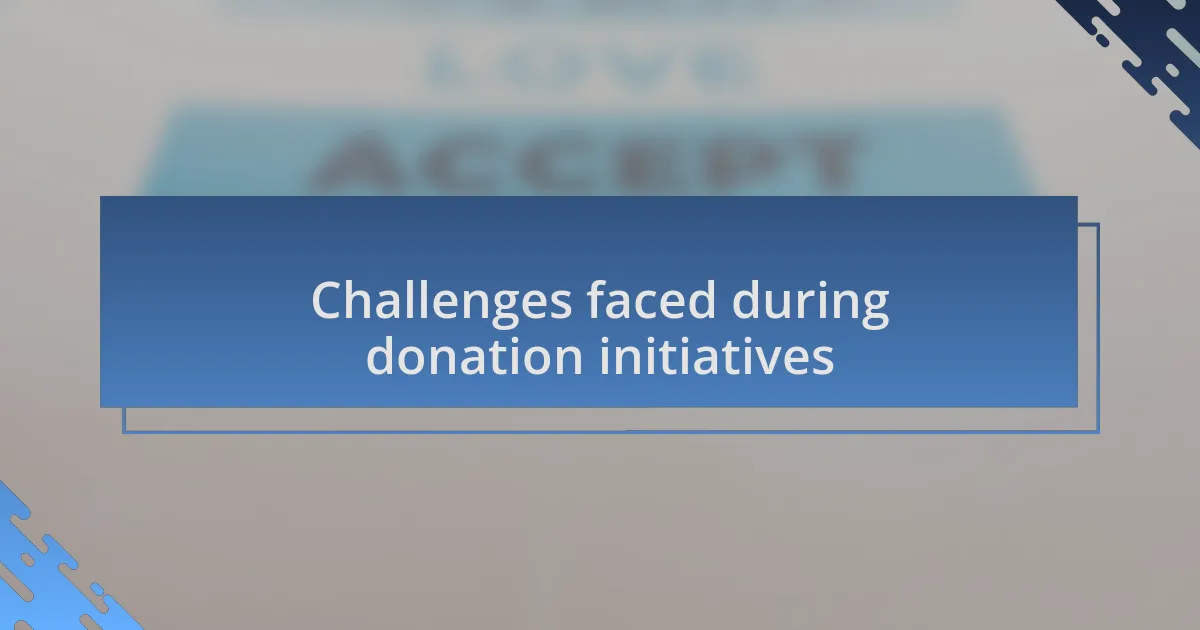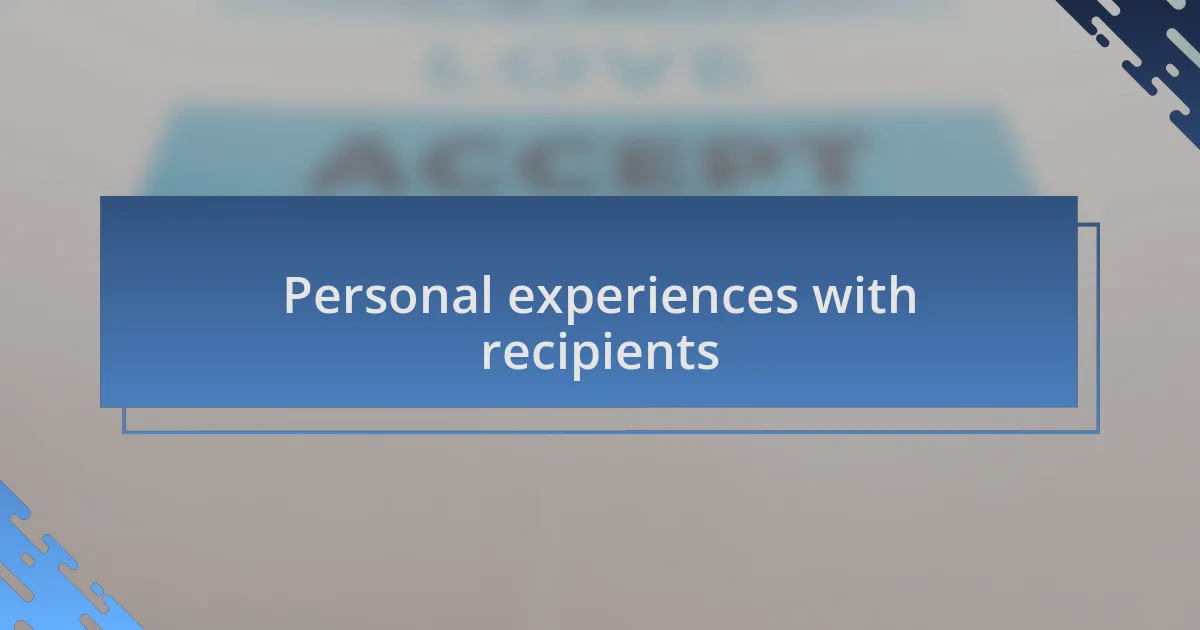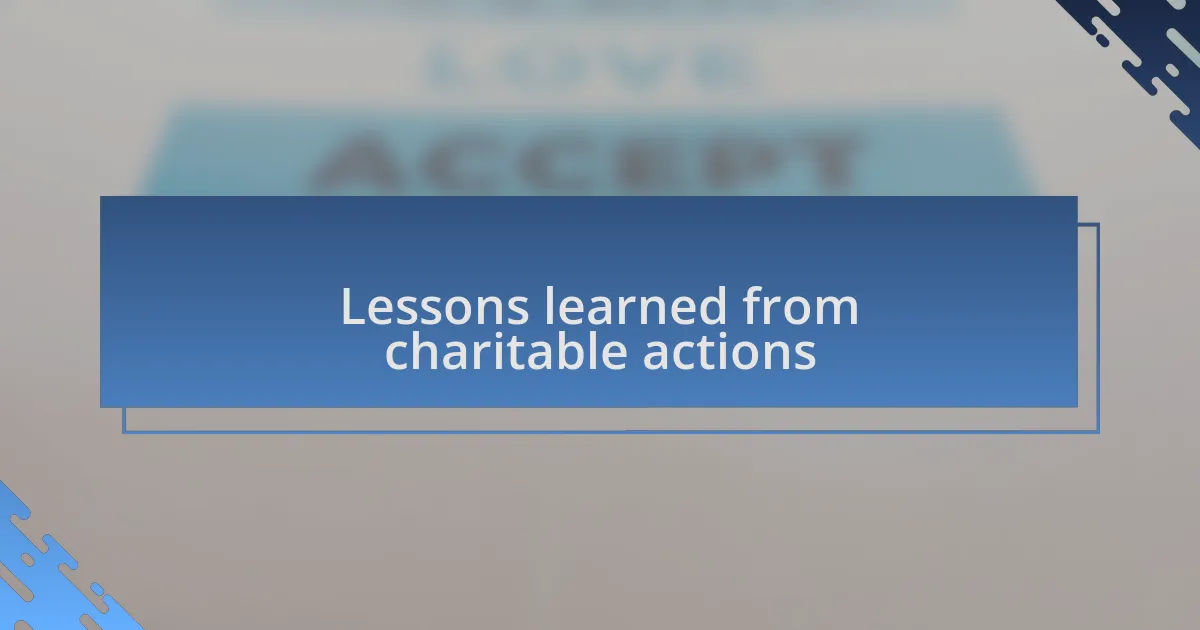Key takeaways:
- Homeless charity efforts foster empathy and human connection, highlighting the transformative power of small acts of kindness.
- Challenges in donation initiatives include misalignment with community needs, emotional toll on volunteers, and logistical issues.
- Personal interactions with recipients emphasize the importance of dignity, respect, and fostering genuine human connections in charitable acts.
- Consistency in volunteering reveals the long-term impact on individuals’ lives and reinforces the need to prioritize compassion and understanding.

Understanding homeless charity efforts
Homeless charity efforts are often more than just providing food or shelter; they represent a lifeline for many. I remember volunteering at a shelter one winter — the sheer warmth of human connection struck me deeply as we shared stories over a meal. Have you ever noticed how small gestures can create significant impacts? It’s in these moments that I realized the importance of empathy in our charity work.
At times, we might question the effectiveness of our contributions. Are we truly making a difference? I often found myself pondering this as I watched individuals transform through programs that offered not just resources, but also hope. This transformation reminded me that every act of kindness, no matter how small, can be a stepping stone toward recovery and stability.
Engaging with the homeless community has taught me that charity is not a one-way street. Through their stories, I’ve come to understand the complexities surrounding homelessness. One gentleman I met shared how he lost his job but gained a sense of purpose through volunteer work in the shelter, illustrating that while we aim to offer help, we often receive invaluable lessons in resilience and gratitude in return.

Challenges faced during donation initiatives
One of the primary challenges I encountered during donation initiatives was the sheer unpredictability of needs. For instance, I remember organizing a food drive and realizing too late that the majority of the items collected were not what the recipients actually desired. It left me wondering, how can we better align our offerings with the genuine needs of those we aim to help? Successful donation efforts require constant communication with the community, a lesson I learned the hard way.
Another significant barrier is the emotional toll on volunteers. I recall one particularly intense day when I helped distribute supplies at a local park. Witnessing the despair on some faces was overwhelming, and it forced me to grapple with my own feelings of helplessness. It begged the question: how do we maintain our motivation when confronted with such stark realities? Finding ways to channel our emotions into positive action can be just as vital as the physical donations we provide.
Lastly, logistics often pose a substantial challenge. When coordinating a donation event, I vividly remember the chaos of organizing pickups, storage, and distribution. One time, we faced delays due to unexpected weather conditions, which led to a last-minute scramble. It made me think about how critical it is to have backup plans. What strategies can we implement to create more resilient operations in the face of uncertainty? Being proactive in our planning enables us to respond more effectively when obstacles arise.

Personal experiences with recipients
I remember a moment that struck me deeply while providing clothing to individuals in a downtown shelter. One recipient, a young woman named Maria, clutched a warm coat I had brought, her eyes lighting up with gratitude. It made me realize how something as simple as a jacket could transform someone’s day. I found myself asking, how often do we take warmth for granted?
Another poignant experience came when I met an elderly man during a meal service. He shared his story of being displaced after his home was lost to a fire. Listening to him speak about his life made me feel a strong connection; it was a stark reminder that each recipient has a unique background and struggles. How can we ensure that our actions are not just about the donations but also about fostering that human connection?
On a different occasion, while delivering hygiene kits, I encountered a father and his young daughter. The joy on his face as he received essential toiletries for her was heartwarming. I had to pause and absorb that moment – it underscored the importance of dignity in our charitable efforts. What does it say about us when we prioritize not only giving but also respecting the humanity of those we help? Each interaction like this reinforces my belief that empathy must accompany our donations.

Lessons learned from charitable actions
When reflecting on my charitable actions, I’ve learned that consistency is key. Volunteering regularly at local shelters showed me the faces behind the statistics. One evening, I bumped into someone I’d helped months prior. She smiled warmly and introduced me to her daughter, a beautiful reminder that our efforts can create lasting change in lives we may only touch briefly. Doesn’t it feel rewarding to know that we can play a part in someone’s journey toward stability?
I’ve also realized that true impact goes beyond tangible gifts. During a fundraiser, I interacted with individuals who shared their hopes and dreams. One woman spoke of her desire to start a small business, and it struck me how often we define charity by material contributions alone. How powerful it can be to uplift someone’s spirit and ambitions, reminding them that they are seen and valued!
Another lesson revolves around patience and understanding. While volunteering at a food pantry, I witnessed the frustration some people experienced during the distribution process. It was a tough moment, but it reminded me that we must always approach our charitable work with compassion. Are we truly listening to the needs of those we serve, or are we merely going through the motions? Such reflections have deepened my commitment to striving for empathy in every interaction.